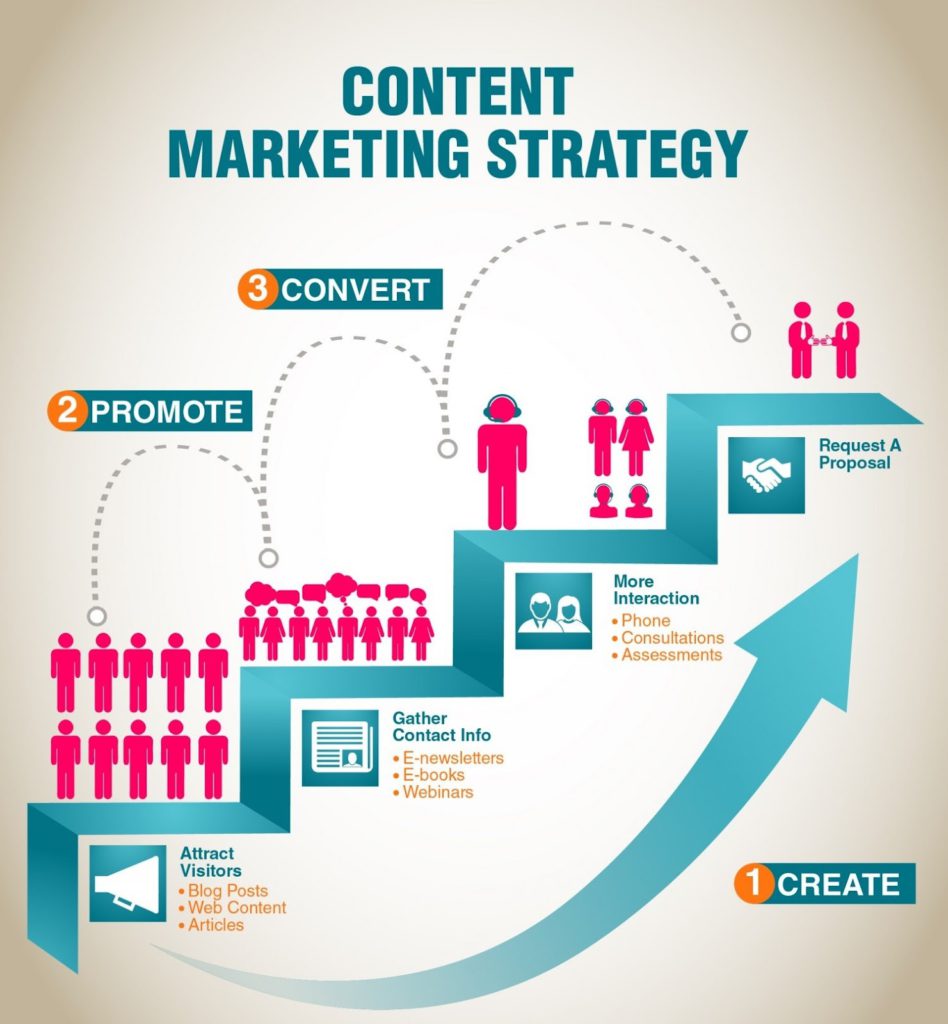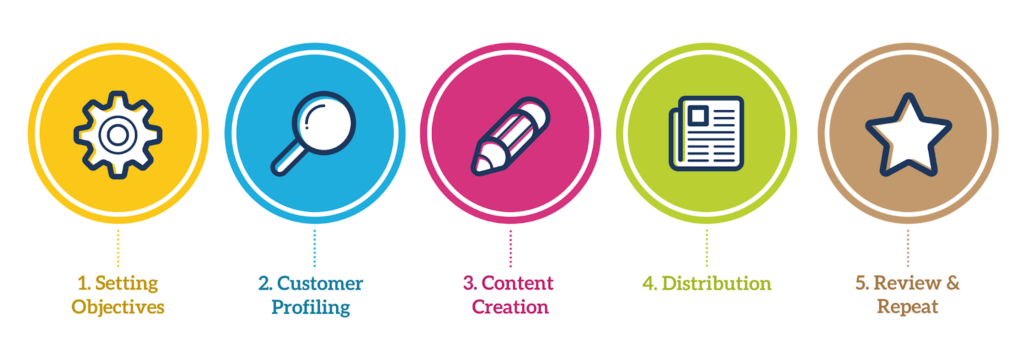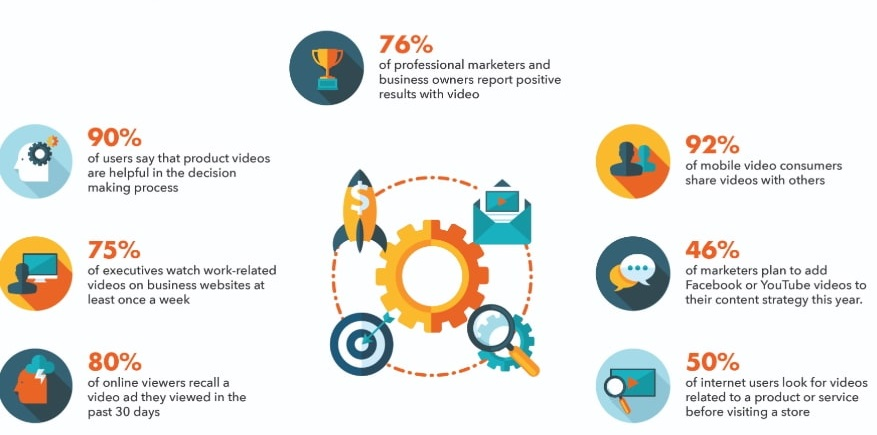A Quick Guide to Kickstarting Your Small Business Content Marketing Strategy

Table of Contents
- Relevance of a Content Marketing Strategy for a Small Business
- 7 Step Guide to Creating a Content Marketing Strategy for Small Businesses
- Key Takeaways
- Conclusion
- FAQs
Content marketing costs 60% less than any traditional form of marketing, making it an ideal choice for small businesses. Content marketing is best for small businesses as its returns are long-term. The belief that meaningful and valuable content forms a bond of trust between the customer and the brand is the core of content marketing strategy for small businesses. Small business content marketing strategies must create meaningful content for their target audience. Another crucial content marketing tip for small businesses is to utilize proper distribution channels. If one is patient and makes consistent efforts, content marketing for small businesses will yield excellent results.

Content marketing has been around for more than a century now. It all started in 1895 when John Deere released its quarterly magazine ‘The Furrow.’ This wasn’t a catalog of its products but talked about agricultural tips and tricks that resonated with its readers. Cut to the present day when the internet has allowed us to advertise our business to countless potential customers through the various types of content marketing and a relevant content marketing strategy.

With the evolution of technology, new forms of content are making their way to the market. An estimated 3.8 billion users access the internet from their mobile phones, according to Statista, and this makes it easier for businesses to reach more people than ever before. Additionally, a robust content marketing strategy for small businesses has become the foundation for growth. In fact, as per a HubSpot survey, 70% of marketers are actively investing in content marketing.
Relevance of a Content Marketing Strategy for a Small Business
Content marketing is all about creating and distributing high-quality content for people to help them form an opinion about your brand. If you are a small business looking to promote your brand, creating unique content is paramount.

Content marketing costs about 62% less than any form of traditional marketing, according to DemandMetric, while generating five times as many leads. Developing a concrete content marketing strategy can unlock new opportunities to gain momentum in the market. Content marketing strategy for small businesses has become an effective way of competing with larger competitors without spending too much on marketing collateral. Customized content is gaining massive popularity, where brands can showcase their unique values and grab the attention of prospects on the internet. Modern marketing is quick, and a content marketing strategy is a compass that can help your business navigate a sea of information.
7 Step Guide to Creating a Content Marketing Strategy for Small Businesses
We have curated a comprehensive seven-step guide to kickstarting content marketing strategy for your small business. Here’s what you should consider if you want to make the most of your content promotion online:
1. Define your mission and objectives
Content marketing is all about developing a relationship with readers and viewers. When starting with a content marketing strategy, it is essential to define your goals clearly. Extensive research can help you understand the expectations of internet users. By analyzing the trends on the internet, you can design and develop content that appeals to your target audiences.

While preparing a content marketing strategy for small businesses, it’s essential to set clear objectives and achieve the best results within a dedicated time frame. The purpose of a content plan is to ensure that you stick to consistent and seamless delivery of content to engage with internet users.
Some examples of setting objectives include:
- Picking a brand tone and identity;
- Choosing the ideal promotional channels to reach your targets;
- Dedicating an ad budget to online promotions;
- Deciding on how frequently you must post on social media;
- Choosing the right kind of content for each promotional channel;
- Creating a plan to generate leads and track their progress; and
- Analyzing market data to draft a compelling content plan.
You can set up a content marketing strategy that works for your business when you have clearly defined objectives.
2. Identify the performance metrics of your content
An essential aspect of content creation is the ability to assess the performance of your content. Especially when marketing small business content online, it becomes much easier to track the performance of your content and decide what works for your viewers. Keeping tabs on the reaction to your content is necessary to build a relationship with the market. Various businesses have various needs, and the internet can simplify the performance of your content with statistics.
Some factors that indicate the performance of your content are:
- Unique page views
- Click-through rate of your ads
- Shares on social media
- Comments on your post
- Net revenue generated
- The conversion rate of online campaigns
- Average time users spend on your website
With a clear idea of how to assess the performance of your content, you can distribute the suitable material to the ideal persona of your viewership.

3. Pick the right channels for content promotion
One of the most fundamental aspects of a content marketing strategy for small businesses is picking the correct channels to start advertising. While Facebook has more than four billion users, this market is a go-to option for almost every business. On the other hand, Instagram is a platform known for businesses keen on photo-sharing and product displays. Pinterest is another photo-sharing platform focusing on infographics, memes, and visually stunning graphics.
Each platform has a unique identity that influences the content that works well for its users. Other platforms like LinkedIn, YouTube, and Google+ also offer a vast user base access. To ensure that your business delivers the best experiences to viewers, choosing the proper promotional channels is important. This can save time and costs by providing quality content to ideal customers.
Understanding your target audiences is vital to picking the right channel to formulate your small business content marketing strategy.

4. Make a schedule that works
Consistency is the key in content marketing for small businesses. When you develop a content marketing strategy for small businesses, it must align your objectives with the pattern of consumption among your audiences. You must know the busiest time of your audience. You must know which days are likely to work for contest ideas and what types of videos ensure splendid engagement.
Social media analytics, ad performances, and blog views are all great insights into developing a schedule that works for you and your audiences. Additionally, making a schedule gets everything more organized. When you deliver consistent, quality content to viewers, the credibility of your business skyrockets. A schedule for all your content promotions online can save time and costs and boost your content marketing strategy benefits.
One of the biggest struggles in content marketing for small businesses is to ideate content constantly. With a comparatively lesser number of products and staff, you are more likely to have a dry content funnel. Peppertype.ai is an artificial intelligence-powered content generator. It is brought to you by Pepper Content. It is affordable and accessible for small businesses.

5. Focus on distributing quality content
Once you have a clear idea of approaching your goals in content promotion, it’s time to develop the best content. After identifying the types of content your team will work with, you can dedicate time and energy to bringing the best quality. The internet is filled with information. Your content should be good enough to inspire viewers to take action to stand out from the competition. Use video marketing, interactive polls, and creative visuals, and engage with your audience on social media to further your relationship with the market. When your content promises quality, more users will depend on your business as a source of information.
The most critical aspect of content marketing for small businesses is to generate reactions and interact with people in a way that showcases your brand in the best light. Your goal as a business is to advertise your product and services while providing value to the people who come in contact with your content.
6. Track the results of your content plan
Once you get going with the distribution of content on social media, websites, or email, you understand what works well. Understanding how people respond and react to your online campaigns is fundamental to your success. Utilize every opportunity to collect data about your viewers, customers, and experiences. Facebook analytics, Google analytics, YouTube analytics, website analytics, and blog subscribers are all great ways of tracking the results of your content performance. Businesses can use many free tools to determine the click-through rate, with webinar registrations and viewer retention being among numerous other metrics. For each piece of content that goes online, your business should track the results. That’s how you continue to improve your content for consumers.

7. Refine your plan and repeat your winning tactics
Content marketing for small businesses is focused on creating better experiences for users. Your content should be engaging, informational, and easily understood by people. To ensure that your business delivers the right message, it is important to analyze the response to your publications. Companies can provide a content marketing strategy that works best by striving to make each interaction with the market engaging. After all, you are advertising for goodwill, credibility, engagement, publicity, and conversions. To guarantee conversions, your content should inspire people to take action. Refine your approach with every credible insight you gain from promoting your content on various online platforms. As time progresses, you will have an arsenal of high-performance strategies that will win the hearts of your customers. In today’s world, content is quality, and quality is enhanced through enough research and analysis.

Key Takeaways
- Content marketing for small businesses is essential for their success. By providing valuable content, you gain the trust of your customers, and they are more likely to purchase from you.
- Do content marketing for small businesses the proper way with a content schedule. Maintain a punctual posting schedule. Try to be on top of your target audience’s minds but do not spam them with promotions.
- The success of small business content marketing relies on settling realistic goals. Content marketing won’t yield overnight results (unless your post goes viral!); however, you will see results if you make consistent efforts.
- Content marketing strategy for small businesses should focus on distributing content effectively. Make sure that your content matches the needs of your chosen platform.
- The biggest content marketing tip for small businesses is to create meaningful and targeted content for a specific audience.
- Facebook analytics, Google analytics, YouTube analytics, website analytics, and blog subscribers would help you keep track of your content marketing efforts for small businesses.
- It is crucial for small business content marketing strategists to monitor winning moves and repeat them.
- Peppertype.ai, an instant high-quality content generator powered by artificial intelligence, helps ideate content for small businesses.

Conclusion
The pandemic has witnessed the rise of a number of small businesses. As businesses moved online to combat the new remote work culture, small businesses could utilize digital marketing to grow their business. An essential hindrance in small business content marketing strategies, offices were no longer needed. Small companies could promote their products on social media, and there was no need for billboard advertisements. Now that businesses have realized the potential of content marketing for small businesses, it is most likely to continue making ripples in the upcoming years.
FAQs
The most important thing to keep in mind when strategizing content for small businesses is their target audience. Only meaningful and valuable content will yield conversions and sales. Five steps to creating a content marketing strategy include:
– Set your goals
– Define your user personas
– Do a content audit
– Create an editorial calendar
– Create a content infrastructure
You can create a content marketing strategy by following the below steps:
– Establishing well-defined goals
– Setting up Key Performances Indicators (KPIs)
– Picking the right content for each channel
– Setting a budget
– Distributing content and examining the response
Source
A content strategy includes the creation of various types of content marketing like blogs, infographics, videos, visuals, etc., and its planning, delivery, and governance. This strategy helps in marketing a business’s products and services on digital channels like social media, websites, etc. Small business content strategy focuses on creating brand awareness in the initial stages, slowly moving towards later conversions. The biggest USP of content marketing for small businesses is their community feeling. Cute greeting cards to an intimate chat; small business content marketing strategy could optimize these to appeal to their target audience.
Content marketing can help small businesses by:
– Growing brand awareness and maintaining brand identity.
– Gaining an edge over competitors who are not deploying content marketing.
– Creating trust amongst customers and prospects.
Content marketing is much more critical for small businesses because they don’t have the marketing budgets that bigger firms have. Also, since content marketing has a high ROI and involves low cost, it is ideal for companies just starting out. Small businesses’ intimate, close-knit, community-feeling must be utilized in their content marketing efforts. A small business content marketing strategy could also focus on the quality and sustainability of their products to appeal to their target market.
Latest Blogs
Learn how to rank on AI search engines like ChatGPT, Perplexity, and Gemini by optimizing your content for authority, structure, and relevance. Stay ahead in AI-driven search with this strategic guide.
Explore the best healthcare SEO services for your medical practice. Improve online visibility and effectively reach more patients in need of your services.
Discover top social media agencies specializing in banking solutions, enhancing financial services and driving engagement.
Get your hands on the latest news!
Similar Posts

Content Marketing
5 mins read
Top 10 Financial Marketing Agencies to Help Your Business Succeed

Content Creation
5 mins read
AI for Marketers Unlocking Smarter Strategies for Content Creation

Content Marketing Strategy
6 mins read